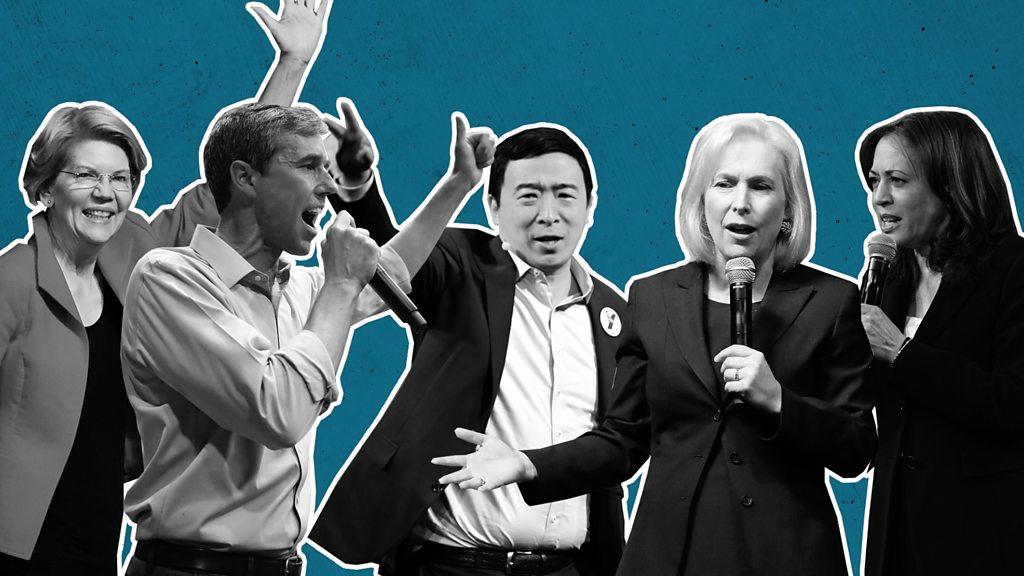Democratic debates: Five things to look out for
- Published
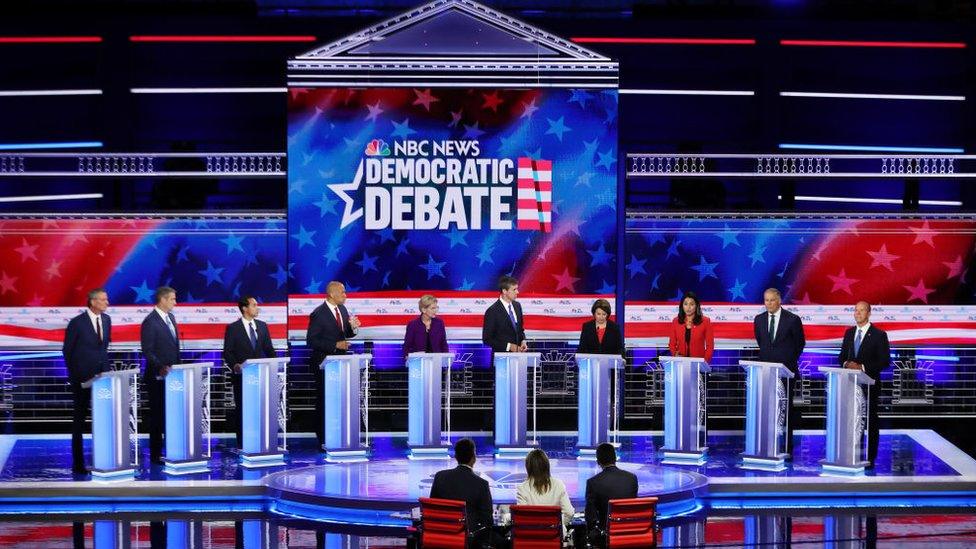
The first night of debates were in June
It's time for Round Two in the Democratic primary debates.
Or, to be more precise, it's round 2a and 2b, since once again the sprawling Democratic field will be divided into two groups of 10, each with two hours on prime-time television to scuffle and struggle and jostle and whatever other verbs it takes to separate themselves from the pack.
Although the groupings have been shuffled, Tuesday and Wednesday night in Detroit will feature almost entirely the same cast of characters as in June. The one change is that California Representative Eric Swalwell has passed the torch, so to speak, to Montana Governor Steve Bullock.
Swalwell, in fact, dropped out of the race entirely, instead announcing he would run for re-election to the House of Representatives.
His presence will be missed. By someone. Probably.
There are plenty of things to watch for among the candidates who did make the cut, however. Here are a few.
Biden in the crosshairs again?
The highlight of the first round of debates was the exchange between former Vice-President Joe Biden and California Senator Kamala Harris over the former's record of opposing school desegregation via mandatory bussing back in the 1970s.
"Exchange" may be putting it nicely. It was a one-sided affair, as Biden appeared caught off guard by Harris' criticism, which culminated with her noting that she was a direct beneficiary of the kind of efforts then-Senator Biden opposed.
The encounter crystallised the consensus that the former vice-president had an uneven debate performance and helped give Harris a noticeable boost in the polls (accompanied by a Biden dip).
Biden has steadied himself since then, but there's blood in the water. He and Harris once again share the stage in the Wednesday night debate, and Biden has said he'll be ready this time.
Harris and Biden clash over his race record
He better be. The shots, however, may not come from Harris, who has probably squeezed all the benefit she can from tussles with Biden. Others on the stage - particularly Senators Cory Booker and Kirsten Gillibrand - may have taken note of Harris's success and seek to replicate it.
Booker has already taken aim at Biden's sponsorship of a harsh anti-crime bill in the 1990s, calling him an "architect of mass incarceration".
Right now a plurality of Democratic voters appear to think Biden is the candidate best able to go toe-to-toe with Donald Trump in 2020. He'll have to prove he can handle his primary opponents first, however. He didn't do that in the first debate June. He'll have another opportunity on Wednesday.
Falter again, and the whispers that he may not be the man for the job will grow louder
Sanders vs. Warren at last
One of the big line-up disappointments from the last round of debates was that Elizabeth Warren and Bernie Sanders - the two candidates competing the hardest for the hearts and minds of progressive Democrats - appeared on different nights.
On Tuesday the anticipated face-off will finally happen.
The ingredients are there for sparks to fly. After a slow start, Warren has been steadily building support and surpassed Sanders both in second-quarter fund-raising and in some of the early-state polls.
Elizabeth Warren: "Economy is good for a thin slice of America"
Warren represents a serious and growing threat to the Vermont senator's presidential hopes. It's still not clear, however, that he knows how to address it.
It would benefit the Vermont senator to take his fellow New Englander down a notch, but he has provoked criticism every time he, or a member of his campaign, try to do it.
There are definitely contrasts to be drawn. Sanders, unlike the former Republican Warren, has been a long-time advocate of progressive causes. Warren's "I have a plan" campaign strategy tends to advocate changing the system from within, while Sanders speaks of a people-driven political "revolution".
The challenge for Sanders will be trying to find a way to highlight those contrasts without being perceived as attacking another star of the progressive moment.
Meanwhile, Warren won't want to rock a campaign boat that has been picking up steam. If this all ends in hugs and smiles, that's just fine with her.
Beto vs Buttigieg
Last summer, Beto O'Rourke was a political sensation.
His campaign to unseat Ted Cruz from his Senate seat in solidly conservative Texas made national headlines. He was drawing huge crowds and fundraising like a top-tier Democratic presidential candidate, not a congressional back-bencher.
The 46-year-old former punk rocker was seen as the face of a new generation of politicians, with a youthful energy and charisma that stood in stark contrast to the elderly leaders of both political parities.
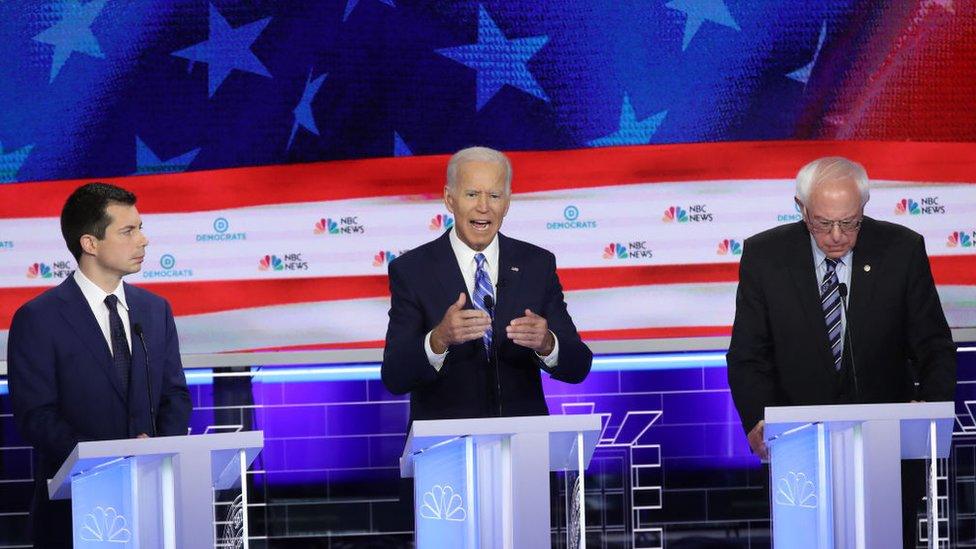
Pete Buttigieg, Joe Biden and Bernie Sanders at the first Democratic debate
Fast forward a year, and the bloom is off O'Rourke's rose. He's sagging in the polls, and the money isn't flowing like it used to. Instead, Pete Buttigieg, the 37-year-old mayor of South Bend, Indiana, is now the guy getting the glowing press. He led the Democratic pack in second-quarter fund-raising and is the one talked about as a standard-bearer for a new political generation.
For the first time on Tuesday night, the two will share a debate stage. In last month's debate, O'Rourke underwhelmed, appearing timid and uncertain while getting pushed around by Julian Castro on what should be one of his strengths, immigration policy.
This next debate could give the Texan a chance to regain some of his lost lustre - perhaps at Buttigieg's expense.
He's going to have to do something to shake things up, because the path he's currently on ends next to Eric Swalwell.
First night so white
The Democrats this campaign have the most diverse major-party presidential primary field in American history. You wouldn't be able to tell by looking at the stage on Tuesday night's debate, however.
CNN responded to criticism about the opaque way NBC announced the field for its two June debates - which included most of the top-tier candidates on one night - by having a televised drawing event akin to a World Cup group-selection show. The end result, however, left much to be desired.
Democrats clash over policy, history and food
The 10-person field on Tuesday night's debate has none of the five minority candidates. The party's first foot forward this time around will reflect little of the range of ethnicities that make up the heart of the modern Democratic Party. (And Warren's presence prompted more than a few jokes from conservatives about her claimed American Indian heritage.)
Donald Trump's recent criticisms of minority Democrats in Congress, including Ilhan Omar and Baltimore Congressman Elijah Cummings, has rekindled a debate about race - and racism - in American society. The topic will certainly come up in the first debate. Will anyone on the stage be able to convincingly address it?
Last chance saloon
It may not be hard to detect a whiff of desperation in the air this week. When the next official primary debate rolls around in mid-September, only 10 candidates will make the cut. In other words, at least half the men and women on the stage in Detroit are going to be left watching from the sidelines - if they're still in the race at all.
The mark to qualify for the Houston debate doubles - to at least 2% in an average of polls and more than 130,000 unique donors. So far, the only candidates to clear both hurdles are Biden, Buttigieg, Harris, O'Rourke, Sanders, Warren and Booker.
For the rest of the candidates, there's work to be done. This could be the final opportunity to make their case in front of a national audience; their last chance to bottle the fabled political lightning and transform from also-ran to at least a maybe-can-run.
You know what desperate times call for.

Who will take on Trump?


- Published27 June 2019
- Published1 July 2019
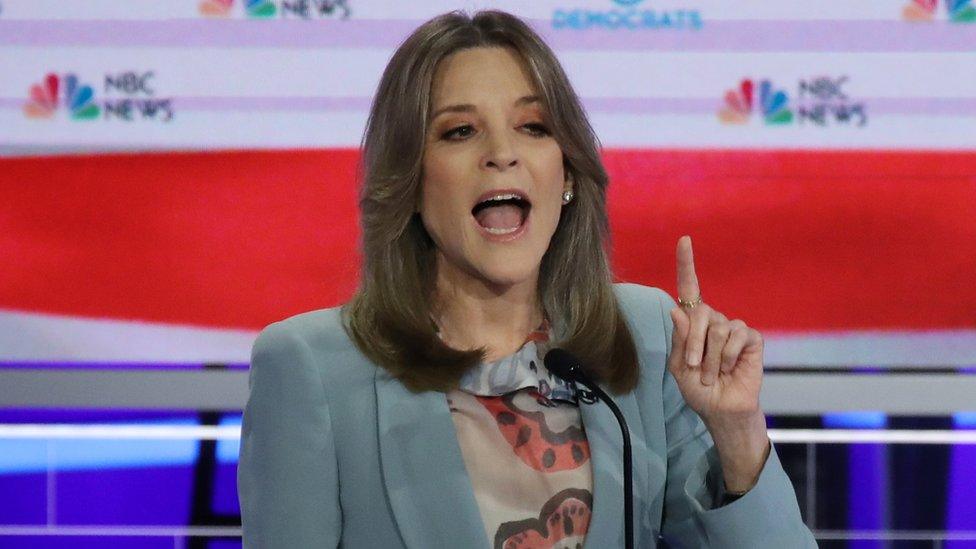
- Published27 June 2019
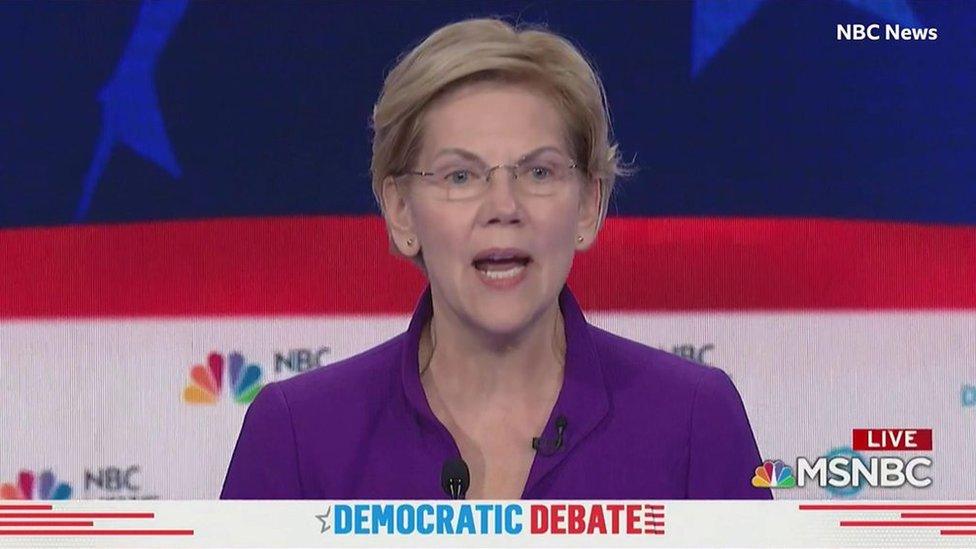
- Published27 June 2019
